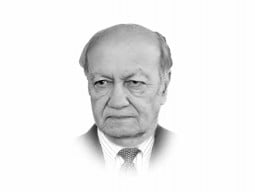
Afghanistan is on the cusp of Taliban rule. Pakistan’s prime minister has shown the inclination to have a morally stringent system where women are modest and men their defenders. The Punjab textbook board has refused to accommodate Malala as one of the heroes of Pakistan while also mandating illegal using, for learning purposes, the images of reproductive organs of both human beings and animals. Universities have been sublet to religious parties for the fulfilment of their agendas. Every illustration in this broad canvas is a depiction of society at God’s side. Richard Nixon, then the vice-president of the US, had said about the US that it was at God’s side when the former had almost made Vietnam a killing field and had chalked a plan to strangulate communism with whatever price it may demand. We saw it happening exactly that way. Terrorism was born from the womb of that struggle. We ended up having more phobias than the world had to deal with during the Marxist-Leninist-dominated world. We have had more people killed in the war against terrorism than in both world wars combined.
Terrorism visited Pakistan like a roaring fire after 9/11. Indeed, joining ranks with the US in its Afghan war in a retaliatory action to square the 9/11 assaults was detrimental to us. However, what wrecked our home was the policy of creating the buckets of good and bad Taliban — a metaphor used to determine who we had to hand over to the US as terrorists and who we would keep under our wings as assets. Thus at the time we had become both the defenders and the creators of terrorism. The taste of this medicine wasn’t felt until we crusaded against Lal Masjid. That was a turning point. From 2007 to 2014 December, Pakistan became a killing field. Not a single city of Pakistan was spared of bomb blasts and violence. Fortunately, that ugly phase is now behind us. In seven years since the massacre of the Army Public School Peshawar in December 2014, we have defeated terrorism to a large extent. The traces of violence as we see now in Balochistan are less because of the policy of violence that the state had adopted to crush dissenters than the policy of alienation the state is stuck with. Nationalism becomes intense when it is not acknowledged. It becomes brutal when it is crushed. And it becomes insane when taken for granted. We have done it all in Balochistan. We refused to acknowledge the rights of the Baloch to their resources, crushed them when they demanded to be treated on a par with citizens of other provinces and took them for granted when they claimed a participatory role in the development of their region. We may have defeated terrorism, but we have yet to deal with extremism, the bane of which could take its toll even if we had decided to move away from the geostrategic paradigm to geo-economic. Suppressing nationalism with underdevelopment has backfired and will continue to do so. Instead, alienation has proved to be a fertile ground in nurturing extremism.
Although extremism is not entirely a religious issue, it had been legitimised in Pakistan mostly through religious decrees. While the state focused its attention on bridging the socio-economic disparity to address extremism, a parallel effort to tune religious discourse has also been in the calling. During the last PML-N government, a platform with the name of Paigham-e-Pakistan was created in this regard. Developed by the Research Centre of the International Islamic University, the project’s mandate was to make illegal all types of extremist behaviour originating from inter-religious disharmony, sectarian discord, misuse of blasphemy laws, and misunderstanding about Jihad. Maulana Tahir Mehmood Ashrafi, the prime minister’s special representative on religious harmony, has taken ownership of the Paigham-e-Pakistan project, which had the backing of almost every religious school of thought in Pakistan and was signed by 1,829 religious scholars. Ashrafi’s Pakistan Ulema Council is the principal carrier of Paigham-e-Pakistan.
According to Ashrafi, inter-religious and inter-sect tolerance and harmony have been successfully practised in Pakistan during the last eight months. There had been no reported killing incidents on religious grounds in the country in the same period. Moreover, the Pakistan Ulema Board is on board with Ashrafi to reinforce the atmosphere of tolerance in the country.
That said and done, there is a dire and urgent need to take the message of Paigham-e-Pakistan to the academic institutions as well, especially the Punjab University, where the student body of Jamaat-e-Islami, the Jamiat, has wrought havoc with its violent policies.
Last but not the least, we may support the Taliban for a peaceful region; however, any replication of their culture in Pakistan may prove disastrous, as the import of Saudi culture proved previously. We need to build a Pakistani culture to respect ourselves as a nation.
Published in The Express Tribune, July 15th, 2021.
Like Opinion & Editorial on Facebook, follow @ETOpEd on Twitter to receive all updates on all our daily pieces.














COMMENTS
Comments are moderated and generally will be posted if they are on-topic and not abusive.
For more information, please see our Comments FAQ